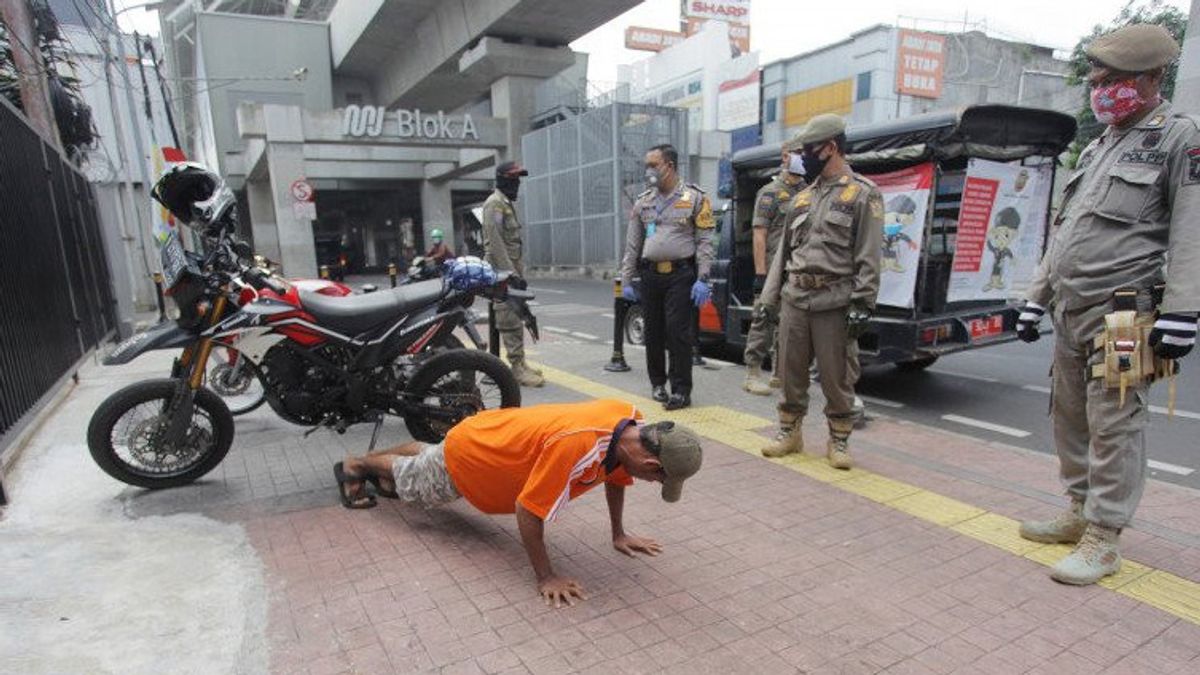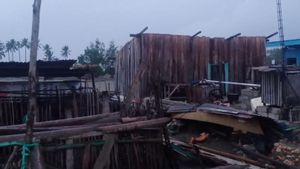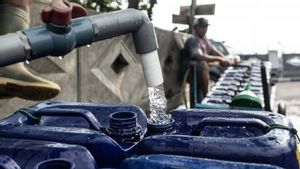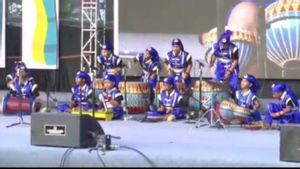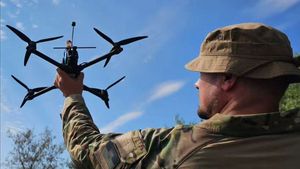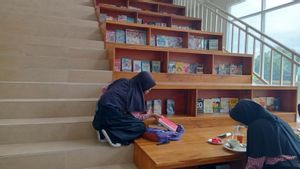JAKARTA - Tuesday, July 20, the government announced the extension of restrictions on community activities until at least July 25. The term which was originally PPKM Emergency was changed to PPKM Level 3 and 4. The terms kept changing. But the meaning remains the same: the government does not comply with the obligations of the Quarantine Law and we still have to save ourselves.
PPKM Levels 3 and 4 are contained in the Instruction of the Minister of Home Affairs (Inmendagri) Number 22 of 2021 and will be enforced on Wednesday, July 21. PPKM Level 4 has no significant difference with Emergency PPKM. Levels 3 to 1 are compiled as criteria in the relaxation measures prepared by the government on July 26 if the trend of daily COVID-19 cases consistently declines.
Like Emergency PPKM contained in Inmendagri 15/2021, PPKM with level criteria in Inmendagri 22/2021 also does not refer to applicable laws, including Law Number 6 of 2018 concerning Health Quarantine which contains many important things as a reference for pandemic policies. in Indonesia.
The Ministry of Home Affairs does not even have a clear position when we refer to Law Number 12 of 2011 concerning the Establishment of Legislation. Researcher from the Institute for Criminal Justice Reform (ICJR), Maidina Rahmawati explained, indeed in article 8 paragraph 2 of Law 12/2011 it is explained that other regulations issued by the minister are also included as legislation.
"But there are conditions. He is regulated as an authority. So there must be a law that delegates this authority," Maidina told VOI.
The instrument for delegating that authority is in the Health Quarantine Law. But the law was not used. Ideally, the government should form derivative rules in the form of government regulations based on the Quarantine Law. PP based on the Quarantine Law can accommodate the entire series of authorities for handling the pandemic.
"This is all in disarray. You should make rules, look at the existing rules as a legal system even in an emergency. It's not complicated. You don't have to make laws. Just make PP. Later, it can still be the authority of the central government," said Maidina.
Why is it important to control with guarantee
What Maidina said is in line with the logic of handling the pandemic version of the epidemiologist from the Faculty of Public Health, University of Indonesia, Pandu Riono. According to Pandu, the government must immediately implement the Quarantine Law. And that can be started from the establishment of a PP based on the Quarantine Law.
One of the most important points of the Quarantine Law is how the government guarantees the lives of the people. This guarantee is the most logical way to stop people's mobility. Appealing and submitting to each individual community is not enough.
A systemic scheme in one command is needed for handling the pandemic. "Just look at the person who is still out of the house. Remember when the PPKM (Emergency) was started, when I went to the office, I found a lot of people working. What's more sad is the people who are less involved," said Pandu.
"Emergency PPKM is not a Quarantine Law. I told you from the start to make government regulations based on the Quarantine Law. Without it, you can't," added Pandu to VOI.
Human rights activist and founder of WatchDoc, Dandhy Laksono, once tweeted about the interchangeability of these terms. Dandhy said that without the guarantee of life as mandated by the Quarantine Law, these terms have the same meaning: save each other.
PSBB. PSBB Transition. PPKM. Micro PPKM. Micro PPKM thickening. Emergency PPKM. As long as there is no guarantee of life, all these terms mean: "Seek your own safety. Good luck".
— Dandhy Laksono (@Dandhy_Laksono) July 1, 2021
Complementing Pandu, an epidemiologist from Griffith University, Dicky Budiman explained the importance of using the Quarantine Law in handling the pandemic. Basically, the Quarantine Law is an instrument that accommodates provisions in public health emergencies.
The emergency situation in question is an extraordinary health event, one of which is marked by the spread of infectious diseases. The situation has been fulfilled. And according to Dicky, the pandemic control scheme that has been regulated in the Quarantine Law is the result of a long study.
There are at least four schemes regulated by the Quarantine Law, namely Regional Quarantine, Hospital Quarantine, Home Quarantine, and Large-Scale Social Restrictions (PSBB). The Quarantine Law does not even recognize the term PPKM, whether the tail is Emergency, Micro or includes level criteria as latest.
Dicky saw that the government deliberately created the PPKM scheme as a shortcut to avoid the obligation to guarantee the community as stipulated in the Quarantine Law. "Actually, the PSBB and the Regional Quarantine have been the result of a long study. I am also involved."
"Only the burdensome thing is that there must be a government burden to cover the costs, the burden of life. That is the burdensome thing. Also there is no clear division of roles between institutions. Yes, there are still many holes," said Dicky to VOI.
How about social assistance today? It is not that. Law 6/2018 mandates more. Article 55 of the Law reads: During the Territorial Quarantine, the basic necessities of life for people and food for livestock in the quarantine area are the responsibility of the Central Government.

Then, Article 8 of Law 6/2018 confirms that everyone has the right to basic health services according to their medical needs, food, and other daily life needs during quarantine. The other necessities of life are clothing, toiletries, washing, and defecation.
After all human life is guaranteed. Only then can we think of sanctions. Law 6/2018 regulates that. Article 93 stipulates penalties for those who hinder the implementation of health quarantine so as to cause a public health emergency.
"... shall be sentenced to a maximum of one year in prison and a maximum fine of Rp. 100 million," it is written in the text of the law.
"Emergency PPKM was made because it was a shortcut. Because the law has many derivatives that haven't been completed. It's not finished yet. That really needs to be fixed. It should be done immediately. In the end, our regulation can't be used," said Dicky
Changing terms
Based on VOI records quoted from the ACTUAL article entitled Changing the Terms of Handling COVID-19 in Indonesia, the government has at least seven times established a COVID-19 handling scheme. Starting from PSBB to the newest PPKM with level criteria.
1. PSBB
This restriction is stipulated in Government Regulation Number 21 of 2020 concerning Large-Scale Social Restrictions in the Context of Accelerating the Handling of Coronavirus Disease 2019 (COVID-19). As explained above, PSBB is one of the schemes regulated by the Quarantine Law.
However, in the PSBB, the government is not obliged to guarantee the basic life of the community as stipulated in the Regional Quarantine. The control of the PSBB is held by the regional government with the approval of the central government. DKI Jakarta is the first province to implement PSBB as of April 10, 2020.
2. Transitional/Proportional PSBB
As of June 4, 2020, DKI Jakarta announced that it was carrying out restrictions on mobility with a number of easing. Its name is PSBB Transition.
Unlike DKI, West Java uses the term Proportional PSBB which is similar to the Transitional PSBB. Broadly speaking, the loosening rules are the same as those applied in Jakarta.
The PSBB and Transitional / Proportional PSBB policies are implemented in a number of regions until January 10, 2021, following the conditions of COVID-19 cases in their respective regions.
3. PPKM
Furthermore, the central government took the helm of handling the pandemic in the regions due to the spike in cases that began to be seen. This is at the same time changing the term PSBB to the Enforcement of Community Activity Restrictions (PPKM).
PPKM was ratified through Inmendagri 1/2021 on January 6 and is valid from January 11 to February 8. This PPKM is implemented at the district-city level specifically for Java and Bali and is led by Coordinating Minister for the Economy Airlangga Hartarto.
4. Micro PPKM
The pattern of mobility restrictions was replaced with the application of the Micro PPKM which took effect on February 9, 2021. Micro PPKM was initiated in Java and Bali through the Ministry of Home Affairs 3/2021. Regions that implement micro PPKM are regions that have applied PPKM previously.
The difference with PPKM, Micro PPKM is more focused on controlling at the community level, namely RT-RW. There are various control criteria depending on the zone, ranging from green, yellow, orange, to red.
5. Tightening of Micro PPKM
Gradually, the Micro PPKM finally took effect in all provinces until June 21, 2021. At that time the COVID-19 condition was increasing, even reaching more than 50 thousand cases per day.
The government has implemented the Micro PPKM Tightening which is valid from June 22 to July 5 through the Ministry of Home Affairs 14/2021.
6. Emergency PPKM
The government has again changed the term for handling the pandemic to PPKM Emergency Java-Bali and several other areas. Emergency PPKM is implemented based on Inmendagri 15/2021 and comes into effect on 12 July.
Meanwhile, outside Java and Bali are still implementing Micro PPKM. During Emergency PPKM, all teaching and learning is done online and face-to-face school trials are stopped.
Business activities in the essential sector may operate at 50 percent, critical 100 percent and beyond that, WFH is required. Then, restaurants and snack stalls are not allowed to dine in.
Shopping activities except pharmacies and drug stores are closed. Supermarkets and the like that sell daily necessities operate at a maximum of 20.00 WIB. Places of worship and public facilities are closed.
7. PPKM Level 4
Most recently, the government has changed the term for handling the pandemic with the names PPKM Level 4 and PPKM Level 3. This is stated in the Minister of Home Affairs 22/2021 regarding PPKM Level 4 COVID-19 in the Java and Bali regions.
*Read other information about COVID-19 or read other interesting articles from Diah Ayu Wardani and Yudhistira Mahabharata.
Other BERNASThe English, Chinese, Japanese, Arabic, and French versions are automatically generated by the AI. So there may still be inaccuracies in translating, please always see Indonesian as our main language. (system supported by DigitalSiber.id)
